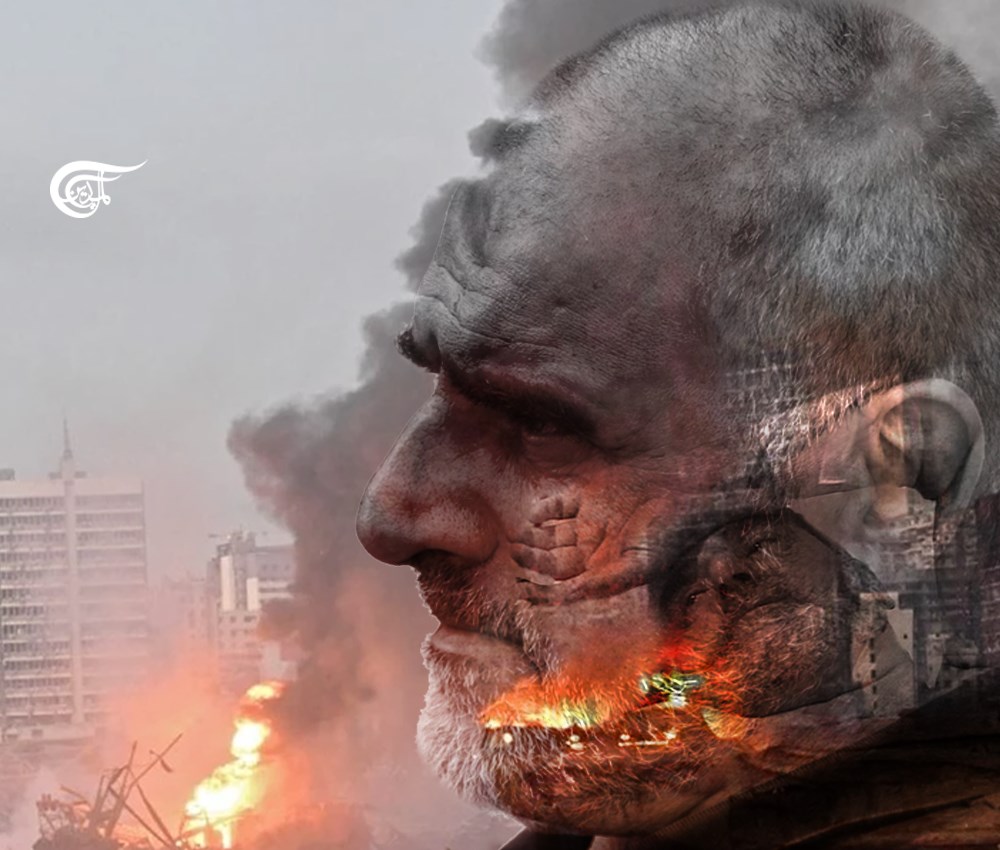Beirut Blast: Postcards of Pain
"I'd go to work, come back to my house at 2 pm, have lunch, sleep, shower, and have some quality time with my family." This is how Mohammad Matar thought his day would go. Instead, he spent it saving his family from death.

You’d catch him right around the corner of the street, on his table with his pack of cigarettes, his phone, and a jar of money.
“250 meters” – a distance Mohammad Matar, whose name also goes by “Abu Khaled,” says repeatedly, reflecting the state of shock he was in at the time. “250 meters. We were only 250 meters away…”
Starting Point
Mohammad had his day planned out:
I'd go to work, come back to my house at 2 pm, have lunch, sleep, shower, and have some quality time with my family.
On that day, instead of going by his normal routine, he spent it saving his family from death.
Abu Khaled was in his living room – a place you normally wouldn’t find him – with his family when the biggest explosion in Lebanese history happened.
He recollects, "I was in the living room. We heard the first explosion. Within seconds, I was on the kitchen floor."
Mohammad had invited his son-in-law to dinner that evening. He narrates, "The family was supposed to meet and have dinner. My wife was in the kitchen frying some chicken, then everything collapsed. My house wasn't my house anymore," he described.
Some kids would come by and buy some chocolate bars, potato chips, and soda from him, interrupting him as we spoke. They’d haul a 1,000 L.L. into Matar’s jar - now worth no more than a meager 5 cents with the devaluation of the currency. He puts the money in a jar and his mind takes him back.
The explosion
"When we heard the first explosion, people were walking down the streets as per usual - we thought it was just a simple fire, nothing else," Abu Khaled said.
"Abu Khaled is injured, Abu Khaled is injured!” Umm Khaled started screaming – being, his wife. Although he felt that he was injured and in pain, Mohammad immediately knew that it was not a deadly injury.
“I knew that I was not going to die,” Mohammad said. Being an ex-militant in the Lebanese Civil War, Abu Khaled was nonchalant about his pain. "I got up, started walking over the rubble. I saw my daughter injured; her injury was right in the head. I just wanted to make sure she was okay, to get her to the hospital," he said.
Abu Khaled stayed in Karantina – his hometown – until 11 o'clock. "I made sure that my daughter, my parents, and my whole family were okay – then, I brought a chair and sat there," he pointed to the center of the neighborhood.
"I just sat there, I didn't want to move. I couldn't comprehend what was happening, I couldn't walk, so I just sat and watched," Abu Khaled explained.
He heard screams and crying; he saw people running, escaping death. "I saw children emerging from their destroyed homes in tears, hijabi women running with bed covers on their heads. It was something I had never seen before."
He continued, "We felt the pressure of the explosion; it was like something pulled us in and then knocked us out. Everything was moving too fast; it was an explosion that whisked people, one by one."
Abu Khaled sat on that chair until 11 PM. During the blast, Beirut's hospitals were full; some people had to wait outside with their wounds.
Physical wounds went, other things stayed
"I was in pain for 3 months – it took 3 months to get rid of my wounds. My ear, arms, and back were wounded. The explosion left blue marks all over my body," Abu Khaled said.
The doctors explained to Abu Khaled that certain chemicals were inside his skin; the blue marks were just reactions and will be gone in a few months.
The 4th of August blast has left people in fear. At any moment, they believe anything could happen. Even the explosion itself might happen again.
"Days after the blast, people started saying that there are chemicals left in Port of Beirut. Do you know what people did here? They left their homes and left; they slept outside of Beirut," Abu Khaled said.
Abu Khaled narrated how his daughters and wife are still living in fear. One of his daughters had to go to a psychologist to heal from everything she had witnessed.
"My daughters screamed for days: if they heard any sound, they would get up and start screaming. We were living the experience of the blast all over again, even after months," Abu Khaled said.
Mohammad has a small café in the neighborhood; he had to sell his car, which was damaged by the blast, to rebuild his house and café.
"I had my life savings, I sold the car, and I had to borrow some money to fix everything – my house and the café." Abu Khaled mourned. He paid around 90 million L.L. to repair his café and house.
"No justice, not here"
Abu Khaled seems optimistic about the coming elections in Lebanon.
"Things will change, I believe in this. I have hope in the next elections, especially the parliamentary elections next year," he expressed.
Yet, Abu Khaled doesn’t see any hope in serving justice in Lebanon.
"There's no justice here. Justice wasn't here even before the blast, what will happen now? Will justice come out of nowhere? I don't think so."
While Abu Khaled was talking, kids passed by, cars whizzed down the road, and the jar of money was filled. Yet, he stayed where he was, on his chair - the chair at the center of the neighborhood, in Karantina, and by the café.

 6 Min Read
6 Min Read










